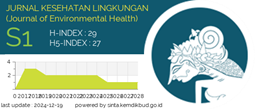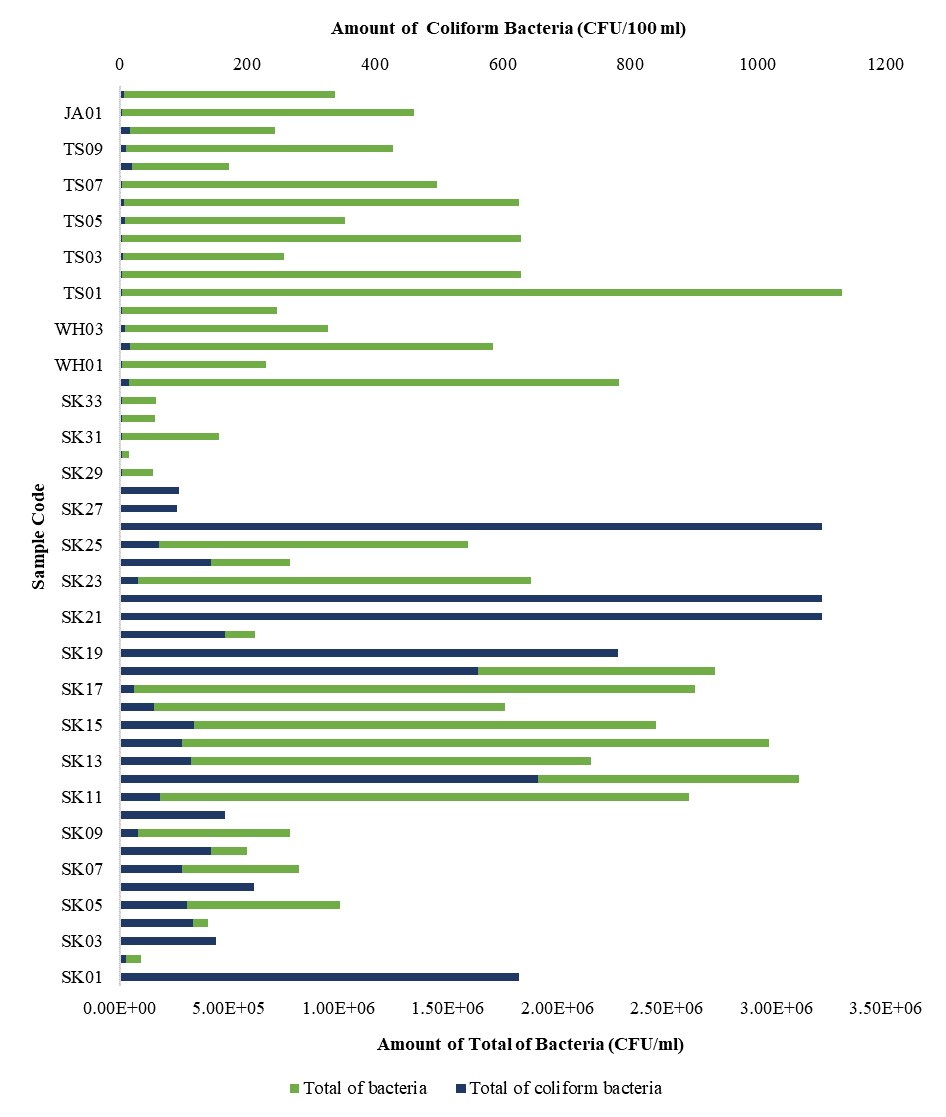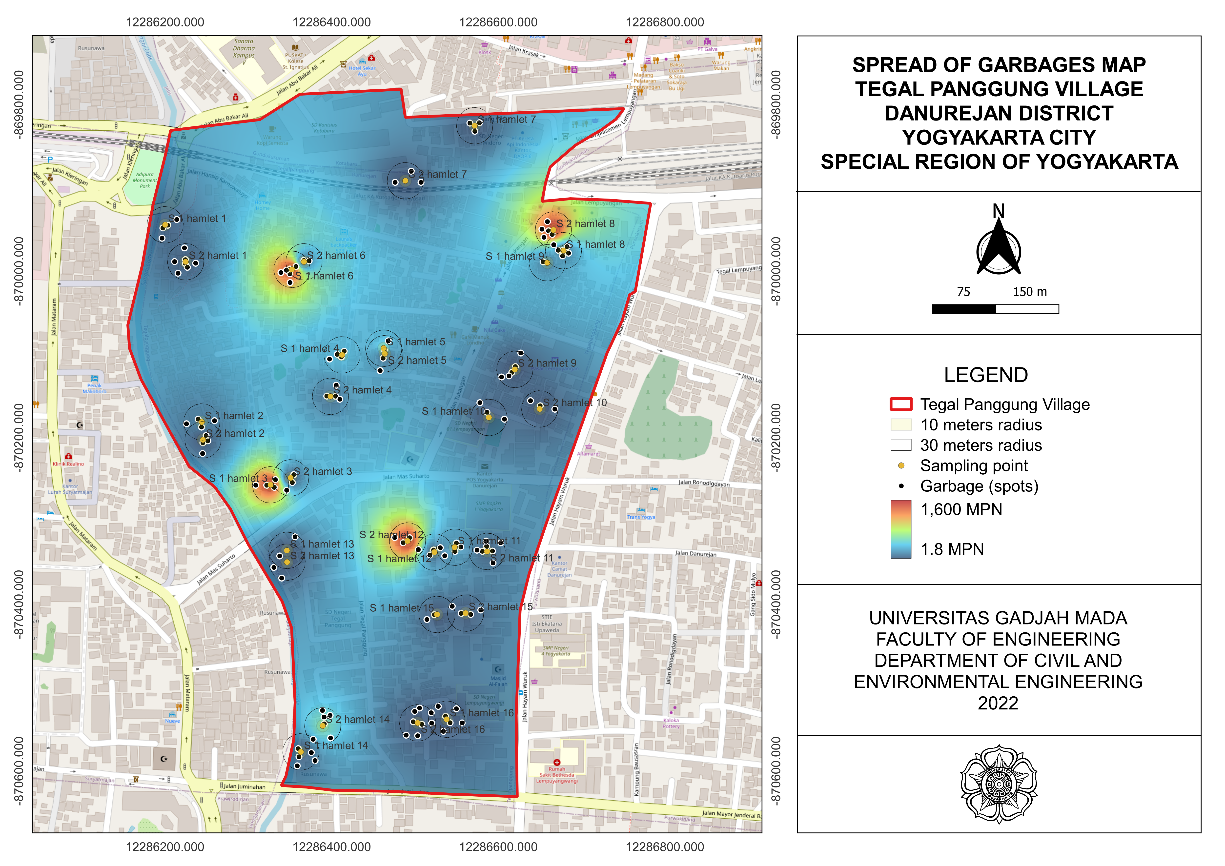Pesticides Exposure and Thyroid Hormone Levels Among Agricultural Workers and Pesticide Applicators: A Systematic Review

Introduction: Presently, the global consumption of pesticides including insecticides, herbicides, and fungicides to protect crops is increasing. Pesticides' role as Endocrine-Disrupting Chemicals (EDCs) has gained great concern in the field of thyroid hormones. Therefore, this systematic review aimed to determine the link of pesticide exposure with thyroid hormone levels among male agricultural workers and pesticide applicators. Discussion: It was discovered that the majority of reviewed articles have similar results concerning the effects of pesticide exposure on the serum levels of thyroid hormones among either farmworkers or pesticide applicators. Commonly, insecticides, herbicides, and fungicides are known as one of the EDCs. The results showed the elevation of TSH and T4 serum levels mostly occurred among groups exposed to insecticide application only rather than those exposed to various pesticide types. Moreover, the hormonal change differed based on each class of pesticide. Conclusion: This review suggests that some types of pesticides extensively used in agriculture might be involved in the increase and decrease in thyroid hormone levels among exposed individuals. Further studies should assess specific types of pesticides and the adverse health effects which involve confounding factors to yield robust analysis.
Ren XM, Kuo Y, Blumberg B. Agrochemicals and Obesity. Molecular and Cellular Endocrinology. 2020;515(110926):1−15. https://doi.org/10.1016/j.mce.2020.110926
Predieri B, Alves CAD, Iughetti L. New Insights on The Effects of Endocrine-Disrupting Chemicals on Children. Jornal de Pediatria. 2022;98(1):S73-S85. https://doi.org/10.1016/j.jped.2021.11.003
Kim KH, Kabir E, Jahan SA. Exposure to Pesticides and The Associated Human Health Effects. Science of The Total Environment. 2017;575(1):525-535. https://doi.org/10.1016/j.scitotenv.2016.09.009
Sarkar S, Gil JDB, Keeley J, Mohring N, Jansen K. The Use of Pesticides in Developing Countries and Their Impact on Health and The Right to Food. Belgium: Policy Department for External Relations, Directorate General for External Policies of the Union; 2021. 1−56 p. https://www.europarl.europa.eu/cmsdata/219887/Pesticides%20health%20and%20food.pdf
Mughal BB, Fini JB, Demeneix BA. Thyroid-Disrupting Chemicals and Brain Development: An Update. Endocrine Connections. 2018;7(4):R160-R186. https://doi.org/10.1530/EC-18-0029
Xiao X, Clark JM, Park Y. Potential Contribution of Insecticide Exposure and Development of Obesity and Type 2 Diabetes. Food and Chemical Toxicology. 2017;105(1):456-474. https://doi.org/10.1016/j.fct.2017.05.003
Taiwo AM. A Review of Environmental and Health Effects of Organochlorine Pesticide Residues in Africa. Chemosphere. 2019;220(1):1126-1140. https://doi.org/10.1016/j.chemosphere.2019.01.001
Han X, Zhang F, Meng L, Xu Y, Li Y, Li A, et al. Exposure to Organochlorine Pesticides and The Risk of Type 2 Diabetes in The Population of East China. Ecotoxicology and Environmental Safety. 2020;190(110125):1−7. https://doi.org/10.1016/j.ecoenv.2019.110125
Hertz-Picciotto I, Sass JB, Engel S, Bennett DH, Bradman A, Eskenazi B, et al. Organophosphate Exposures during Pregnancy and Child Neurodevelopment: Recommendations for Essential Policy Reforms. PLoS Medicine. 2018;15(10):1−15. https://doi.org/10.1371/journal.pmed.1002671
Freire C, Suarez B, Vela-Soria F, Castiello F, Reina-Perez I, Andersen HR, et al. Urinary Metabolites of Non-Persistent Pesticides and Serum Hormones in Spanish Adolescent Males. Environmental Research. 2021;197(111016):1−10. https://doi.org/10.1016/j.envres.2021.111016
Matsuda K, Ihara M, Sattelle DB. Neonicotinoid Insecticides: Molecular Targets, Resistance, and Toxicity. Annual Review of Pharmacology and Toxicology. 2020;60(1):241-255. https://doi.org/10.1146/annurev-pharmtox-010818-021747
Leemans M, Couderq S, Demeneix B, Fini JB. Pesticides With Potential Thyroid Hormone-Disrupting Effects: A Review of Recent Data. Front Endocrinol (Lausanne). 2019;10(1):1−29. https://doi.org/10.3389/fendo.2019.00743
Zhao Y, Yang J, Ren J, Hou Y, Han Z, Xiao J, et al. Exposure Level of Neonicotinoid Insecticides in the Food Chain and the Evaluation of Their Human Health Impact and Environmental Risk: An Overview. Sustainability. 2020;12(18):1−26. https://doi.org/10.3390/su12187523
Pawitra AS, Diyanah KC, Latif MT, Susanto BH, Lusno MFD. Increased Thyroid Hormone Levels in Pesticide Sprayer at Agricultural Area. Kesmas: Jurnal Kesehatan Masyarakat Nasional. 2022;17(1):10−16. https://doi.org/10.21109/kesmas.v17i1.5487
Zeng F, Lerro C, Lavoué J, Huang H, Siemiatycki J, Zhao N, et al. Occupational Exposure to Pesticides and Other Biocides and Risk of Thyroid Cancer. Occupational and Environmental Medicine. 2017;74(7):502−510. https://doi.org/10.1136/oemed-2016-103931
Fiore M, Conti GO, Caltabiano R, Buffone A, Zuccarello P, Cormaci L, et al. Role of Emerging Environmental Risk Factors in Thyroid Cancer: A Brief Review. International Journal of Environmental Research and Public Health. 2019;16(7):1−18. https://doi.org/10.3390/ijerph16071185
Lerro CC, Freeman LEB, DellaValle CT, Andreotti G, Hofmann JN, Koutros S, et al. Pesticide Exposure and Incident Thyroid Cancer Among Male Pesticide Applicators in Agricultural Health Study. Environment International. 2021;146(1):1−8. https://doi.org/10.1016/j.envint.2020.106187
Ruiz D, Becerra M, Jagai JS, Ard K, Sargis RM. Disparities in Environmental Exposures to Endocrine-Disrupting Chemicals and Diabetes Risk in Vulnerable Populations. Diabetes Care. 2018:41(1):193−205. https://doi.org/10.2337/dc16-2765
Juntarawijit C, Juntarawijit Y. Association between Diabetes and Pesticides: A Case-Control Study among Thai Farmers. Environmental Health and Preventive Medicine. 2018;23(3):1−10. https://doi.org/10.1186/s12199-018-0692-5
Park S, Kim S-K, Kim J-Y, Lee K, Choi JR, Chang S-J, et al. Exposure to Pesticides and The Prevalence of Diabetes in a Rural Population in Korea. Neurotoxicology. 2019;70(1):12−18. https://doi.org/10.1016/j.neuro.2018.10.007
Berg ZK, Rodriguez B, Davis J, Katz AR, Cooney RV, Masaki K. Association Between Occupational Exposure to Pesticides and Cardiovascular Disease Incidence: The Kuakini Honolulu Heart Program. Journal of American Heart Association. 2019;8(19):1−9. https://doi.org/10.1161/JAHA.119.012569
Kaur N, Starling AP, Calafat AM, Sjodin A, Clouet-Foraison N, Dolan LM, et al. Longitudinal Association of Biomarkers of Pesticide Exposure with Cardiovascular Disease Risk Factors in Youth with Diabetes. Environmental Research. 2020;181(108916):1−10. https://doi.org/10.1016/j.envres.2019.108916
Setyopranoto I, Argo IW, Ramadhani AF, Dwianingsih EK, Tama WN, Gofir A, et al. The Association between Pesticide Exposure and Neurological Signs and Symptoms in Farmers in Magelang District, Central Java, Indonesia. Open Access Macedonian Journal of Medical Sciences. 2020;8(E):538−543. https://doi.org/10.3889/oamjms.2020.5295
Pratama DA, Setiani O, D. YH. Pesticide Exposure Factors Related To Neurological Symptoms In Farmers Spraying Pesticides. International Journal of Health, Education and Social. 2021;4(11):83−93. https://doi.org/10.1234/ijhes.v4i11.205
Chi HC, Tsai CY, Tsai MM, Yeh CT, Lin KH. Molecular Functions and Clinical Impact of Thyroid Hormone-Triggered Autophagy in Liver-Related Diseases. Journal of Biomedical Science. 2019;26(1):1−15. https://doi.org/10.1186/s12929-019-0517-x
Bellinger DC. Environmental Chemical Exposures and Neurodevelopmental Impairments in Children. Pediatric Medicine. 2018;1(9):1−13. http://dx.doi.org/10.21037/pm.2018.11.03
Kahn LG, Philippat C, Nakayama SF, Slama R, Trasande L. Endocrine-Disrupting Chemicals: Implications for Human Health. The Lancet Diabetes & Endocrinology. 2020;8(8):703−718. https://doi.org/10.1016/S2213-8587(20)30129-7
Calsolaro V, Pasqualetti G, Niccolai F, Caraccio N, Monzan F. Thyroid Disrupting Chemicals. International Journal of Molecular Sciences. 2017;18(12):1−17. https://doi.org/10.3390/ijms18122583
Darbre PD. Endocrine Disruptors and Obesity. Current Obesity Reports. 2017;6(1):18−27. https://doi.org/10.1007/s13679-017-0240-4
Demeneix B, Slama R. Endocrine Disruptors: from Scientific Evidence to Human Health Protection. Brussels: Policy Department for Citizens' Rights and Constitutional Affairs. 2019. 1−132 p. https://www.europarl.europa.eu/RegData/etudes/STUD/2019/608866/IPOL_STU(2019)608866_EN.pdf
Ghassabian A, Trasande L. Disruption in Thyroid Signaling Pathway: A Mechanism for the Effect of Endocrine-Disrupting Chemicals on Child Neurodevelopment. Front Endocrinol (Lausanne). 2018;9(1):1−8. https://doi.org/10.3389/fendo.2018.00204
World Health Organization. Preventing Disease through Healthy Environments. Exposure to Highly Hazardous Pesticides: A Major Public Health Concern. Geneva: World Health Organization; 2019. 1−8 p. https://www.who.int/publications/i/item/WHO-CED-PHE-EPE-19.4.6
Kaur R, Mavi GK, Raghav S, Khan I. Pesticides Classification and its Impact on Environment. International Journal of Current Microbiology and Applied Sciences. 2019;8(3):1889-1897. https://doi.org/10.20546/ijcmas.2019.803.224
Page MJ, McKenzie JE, Bossuyt PM, Boutron I, Hoffmann TC, Mulrow CD, et al. The PRISMA 2020 Statement: An Updated Guideline for Reporting Systematic Reviews. Systematic Reviews. 2021;10(1):1−11. https://doi.org/10.1186/s13643-021-01626-4
Downs SH, Black N. The Feasibility of Creating A Checklist for The Assessment of The Methodological Quality both of Randomised and Non-Randomised Studies of Health Care interventions. Journal of Epidemiology and Community Health. 1998;52(6):377−384. https://doi.org/10.1136/jech.52.6.377
Khan DA, Ahad K, Ansari WM, Khan H. Pesticide Exposure and Endocrine Dysfunction in the Cotton Crop Agricultural Workers of Southern Punjab, Pakistan. Asia Pacific Journal of Public Health. 2013;25(2):181−191. https://doi.org/10.1177/1010539511417422
Slimani S, Boulakoud MS, Abdennour C. Pesticide Exposure and Reproductive Biomarkers among Male Farmers from North-East Algeria. Annals of Biological Research. 2011;2(2):290−297. https://www.researchgate.net/publication/267943337_Pesticide_exposure_and_reproductive_biomarkers_among_male_farmers_from_north-east_Algeria
Simescu M, Igna CP, Nicolaescu E, Ion I, Ion AC, Caragheorgheopol A, et al. Multiple Pesticides Exposure of Greenhouse Workers and Thyroid Parameters. International Journal of Sustainable Development and Planning. 2014;9(1):15−28. https://doi.org/10.2495/SDP-V9-N1-15-28
Piccoli C, Cremonese C, Koifman RJ, Koifman S, Freire C. Pesticide Exposure and Thyroid Function in An Agricultural Population in Brazil. Environmental Research. 2016;151(1):389−398. http://dx.doi.org/10.1016/j.envres.2016.08.011
Al-Shanti TA, Yassin MM. Pesticides Impact on Testicular and Thyroid Functions of Farm Workers in Gaza Strip. Annals of British Medical Sciences. 2017;3(1):3−9. http://abmsj.co.uk/articles/1ABMS%203-9%20.2017.pdf
Lacasana M, Lopez-Flores I, Rodriguez-Barranco M, Aguilar-Garduno C, Blanco-Munoz J, Perez-Mendez O, et al. Association between Organophosphate Pesticides Exposure and Thyroid Hormones in Floriculture Workers. Toxicology and Applied Pharmacology. 2010;243(1):19−26. https://doi.org/10.1016/j.taap.2009.11.008
Quraishi R. Effects of Pesticides on Haematology, Thyroid Stimulating Hormone (TSH) and Tri-iodothyronine (T3) Hormones of Agricultural Workers in Swat, Pakistan. Journal of Biology and Life Science. 2015;6(1):96−107. https://doi.org/10.5296/jbls.v6i1.6463
Bernieri T, Rodrigues D, Barbosa IR, Ardenghi PG, Silva LBd. Occupational exposure to pesticides and thyroid function in Brazilian soybean farmers. Chemosphere. 2019;218(1):425−429. https://doi.org/10.1016/j.chemosphere.2018.11.124
Kongtip P, Nankongnab N, Kallayanatham N, Pundee R, Choochouy N, Yimsabai J, et al. Thyroid Hormones in Conventional and Organic Farmers in Thailand. International Journal of Environmental Research and Public Health. 2019;16(15):1−13. https://doi.org/10.3390/ijerph16152704
Santos R, Piccoli C, Cremonese C, Freire C. Thyroid and Reproductive Hormones in Relation to Pesticide Use in An Agricultural Population in Southern Brazil. Environmental Research. 2019;173(1):221−231. https://doi.org/10.1016/j.envres.2019.03.050
Nankongnab N, Kongtip P, Kallayanatham N, Pundee R, Yimsabai J, Woskie S. Longitudinal Study of Thyroid Hormones between Conventional and Organic Farmers in Thailand. Toxics. 2020;8(4):1−10. https://doi.org/10.3390/toxics8040082
Sirivarasai J, Chanprasertyothin S, Kongtip P, Woskie S. Genetic Polymorphisms of Pesticide-Metabolizing Enzymes and Transporters in Agricultural Workers and Thyroid Hormone Levels. Risk Management and Healthcare Policy. 2021;14(1):3435−3451. https://doi.org/10.2147/RMHP.S314510
Farokhi F, Taravati A. Pesticide Exposure and Thyroid Function in Adult Male Sprayers. International Journal of Medical Investigation. 2014;3(4):127−132. http://intjmi.com/article-1-84-en.html
Lerro CC, Freeman LEB, DellaValle CT, Kibriya MG, Aschebrook-Kilfoy B, Jasmine F, et al. Occupational Pesticide Exposure and Subclinical Hypothyroidism among Male Pesticide Applicators. Occupational and Environmental Medicine. 2017;75(2):79−89. https://doi.org/10.1136/oemed-2017-104431
Shrestha S, G.Parks C, S.Goldner W, Kamel F, M.Umbach D, H.Ward M, et al. Pesticide Use and Incident Hypothyroidism in Pesticide Applicators in the Agricultural Health Study. Environmental Health Perspective. 2018;126(9):1−11. https://doi.org/10.1289/EHP3194
Kongtip P, Nankongnab N, Pundee R, Kallayanatham N, Pengpumkiat S, Chungcharoen J, et al. Acute Changes in Thyroid Hormone Levels among Thai Pesticide Sprayers. Toxics. 2021;9(16):1−16. https://doi.org/10.3390/toxics9010016
Goldner WS, Sandler DP, Yu F, Shostrom V, Hoppin JA, Kamel F, et al. Hypothyroidism and Pesticide Use Among Male Private Pesticide Applicators in The Agricultural Health Study. Journals of Occupational and Environmental Medicine. 2013;55(10):1171−1178. https://doi.org/10.1097/JOM.0b013e31829b290b
Demeneix BA. Evidence for Prenatal Exposure to Thyroid Disruptors and Adverse Effects on Brain Development. Europian Thyroid Journal. 2019;8(6):283−292. https://doi.org/10.1159/000504668
Han X, Meng L, Li Y, Li A, Turyk ME, Yang R, et al. Associations between Exposure to Persistent Organic Pollutants and Thyroid Function in a Case-Control Study of East China. Environmental Science and Technology. 2019;53(16):9866−9875. https://doi.org/10.1021/acs.est.9b02810
Ashraf MA, Wilson M. Endocrine Disrupting Chemicals: Sources, Effects And Treatments. Acta Chemica Malaysia. 2019;3(2):39−47. https://doi.org/10.2478/acmy-2019-0010
Warner GR, Mourikes VE, Neff AM, Brehm E, Flaws JA. Mechanisms of Action of Agrochemicals Acting as Endocrine Disrupting Chemicals. Molecular and Cellular Endocrinology. 2020;502(110680):1−13. https://doi.org/10.1016/j.mce.2019.110680
Babic Leko M, Gunjaca I, Pleic N, Zemunik T. Environmental Factors Affecting Thyroid-Stimulating Hormone and Thyroid Hormone Levels. International Journal of Molecular Sciences. 2021 Jun 17;22(12):1−62. https://doi.org/10.3390/ijms22126521
World Health Organization. WHO Recommended Classification of Pesticides by Hazard and Guidelines to Classification, 2019 Edition. Geneva: World Health Organization; 2020. 1−98 p. https://www.who.int/publications/i/item/9789240005662
Hu W, Gao P, Wang L, Hu J. Endocrine disrupting toxicity of aryl organophosphate esters and mode of action. Critical Reviews in Environmental Science and Technology. 2022;1(1):1-18. https://doi.org/10.1080/10643389.2022.2050147
Åžimşek ZÖ, Sevim M, Åžimşek Y, Sungur M, Gündoğan K, Güven M. Effects of Organophosphate Poisoning on the Endocrine System in the Long Term: A Pilot Study. Erciyes Medical Journal. 2019;41(1):33−36. https://doi.org/10.14744/etd.2019.19122
Seo SH, Choi SD, Batterman S, Chang YS. Health Risk Assessment of Exposure to Organochlorine Pesticides in The General Population in Seoul, Korea Over 12 years: A Cross-Sectional Epidemiological Study. Journal of Hazardous Materials. 2022;424(Part B):1−17. https://doi.org/10.1016/j.jhazmat.2021.127381
Sharma N, Garg D, Deb R, Samtani R. Toxicological Profile of Organochlorines Aldrin and Dieldrin: An Indian Perspective. Reviews on Environmental Health. 2017;32(4):361−372. https://doi.org/10.1515/reveh-2017-0013
Ye X, Liu J. Effects of Pyrethroid Insecticides on Hypothalamic-Pituitary-Gonadal Axis: A Reproductive Health Perspective. Environmental Pollution. 2019;245(1):590−599. https://doi.org/10.1016/j.envpol.2018.11.031
Maruf MA, Azizah R, Sulistyorini L, Zakaria ZA, Marmaya NH, Pawitra AS, et al. Management of Organochlorine Exposure to Health Risks in Asia – A Review. Malaysian Journal of Medicine and Health Sciences. 2021;17(4):332−340. https://medic.upm.edu.my/upload/dokumen/2021100810073745_MJMHS_0960.pdf
Ballesteros V, Costa O, Iniguez C, Fletcher T, Ballester F, Lopez-Espinosa MJ. Exposure to Perfluoroalkyl Substances and Thyroid Function in Pregnant Women and Children: A Systematic Review of Epidemiologic Studies. Environment International. 2017;99(1):15−28. https://doi.org/10.1016/j.envint.2016.10.015

This work is licensed under a Creative Commons Attribution-NonCommercial-ShareAlike 4.0 International License.
1. Copyright of all journal manuscripts is held by the Jurnal Kesehatan Lingkungan.2. Formal legal provisions to access digital articles of electronic journal are subject to the provision of the Creative Commons Attribution-ShareAlike license (CC BY-NC-SA), which means that Jurnal Kesehatan Lingkungan is rightful to keep, transfer media/format, manage in the form of databases, maintain, and publish articles.
3. Published manuscripts both printed and electronic are open access for educational, research, and library purposes. Additionally, the editorial board is not responsible for any violations of copyright law.
JKESLING by UNAIR is licensed under a Creative Commons Attribution-ShareAlike 4.0 International License.







































